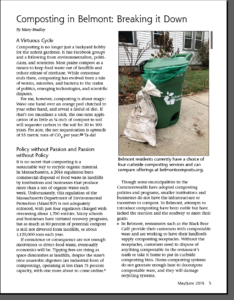More on disposing in the kitchen sink
As a resident of Newton for 20-plus years and an activist in Waltham as well (Waltham Land Trust), I salute Belmont on your newsletter. It stands out, in my experience, as the best suburban NGO volunteer-run information medium. I’ve used its articles in my teaching at Brandeis. So, bravo and well done.
I have a question for Mary Bradley, the compost fanatic (I am one, too, and refer to the May/June 2019 article, “Composting in Belmont: Breaking it Down,” typical of BCF articles in its detail and usefulness), and it’s this: has she checked in with Massachusetts Water Resources Authority (MWRA) about their views on using the disposal in kitchen sinks to send food waste organics to Deer Island?
I remember one somewhat knowledgeable friend of mine, who is on the board of the Charles River Watershed Association and frequently in touch with state lawmakers about energy issues, urging us all not to do that, because the organic load at Deer Island was plenty enough to handle already, processing all the human waste. It is good to know some municipality waste treatment facilities around the US do encourage it, and I know that Deer Island processed “biosolids” are made into pelleted fertilizer.
I just wondered, though, what MWRA would say about disposals as indirect composters. Ms. Bradley, if you have not checked in, I know some folks in MWRA management who could direct this question to Deer Island operators. What do you think?
—Eric Olson, PhD, is a senior lecturer in ecology in the Sustainable International Development Graduate Program, Heller School of Social Policy and Management, Brandeis University.

Response from Mary Bradley:
I want to thank Eric for his kind words and great question and the subsequent emails we exchanged. Eric consulted the experts at MWRA, who confirmed that they have no objections to the use of kitchen sinks as indirect composters.
To sum up for our readers, there is more to the story of compost than I was able to share. The thrust of the “Composting in Belmont” article was to empower readers to choose a method to begin composting today. However, it is a subject rife with the politics of commerce and technology. Changes are happening very quickly. There’s growing recognition that composting is an effective strategy to decrease methane from landfills and sequester carbon from the atmosphere. Some municipalities that complained in the past of damaged pipes due to inappropriate use of kitchen sinks are now advocates due, in part, to reduced trash costs and other factors. That discussion was out of the scope of this article.
I touched on what I consider the most germane concerns about each composting method. The untested fertilizer pellets—possibly containing pharmaceuticals and toxins from a wastewater treatment facility—and the unstudied environmental impacts of the pellets give me pause, but I am still thankful for the kitchen sink when disposing of cat food.
I hope we all find methods that work for us and that we demand our lawmakers and businesses enact aggressive public policies, strong public-private sector partnerships, an efficient waste management system, economic incentives, and public education.


Sorry, the comment form is closed at this time.